Being an extrovert seems like it’s where all the glory’s at. Extroverts get more attention, more likes on social media, and seem to navigate social situations with such ease.
But is being an introvert really a bad thing?
Much like the ancient Chinese principles of the ying-yang, society needs the delicate balance between introverts and extroverts.
While it’s true that introverts can struggle in robust social situations…, there are many benefits of being an introvert that counter balance the downsides.
For example, while extroverts may excel in social setting they can sometimes lack independence, while introverts thrive on independence.
In this article we’ll explore the pros and cons of being an introvert by looking at the latest science, expert opinions, and different perspectives.
Let’s Dive In.
What Makes an Introvert: The Psychology Of Personality
Introversion is one of the five main traits that make up someone personality. According to the experts at Psychology Today, evidence suggests that the brains of introverts do not react as strongly in social situations and produce less dopamine in social situations when compared to the brain of an extrovert.

Licensed psychologist Dr. Kendra Kubala explains introverts perfectly stating that, introversion has to do with gathering and expending physical energy. Introverts recharge and build energy by spending time alone, while they expend energy and feel drained after prolonged social interactions.
And the opposite is true for extroverts.
Introverted People Are Not Necessarily Shy In Social Situations
Introverts are not loud but they’re not necessarily shy. Introverts do however tend to be more quiet, reserved, and introspective when compared to their extroverted counterpart.
It’s a common myth that introverts are shy, but shyness and introversion are two very different things.
Shyness is an emotional reaction, while Introversion is a distinct personality trait
As confirmed by psychologist and psychiatry professor Dr. Jennifer Casarella, those who are shy have a conscious (or sub-conscious) fear or anxiety towards social situations. Usually it has to do with feelings of insecurity, fear, or being judged.
While those who are introverted don’t necessarily have a fear or anxiety about social situations, they would just rather choose a less social option if given the choice.
Many introverts (myself included) are comfortable and confident in social situations but it’s just not our “cup of tea” or favorite place to spend a lot of time.
Is Being An Introvert Bad?
While being an introvert can have its disadvantages there are just as many (if not more) advantages to being an introvert.
Being an introvert is certainly NOT “”bad”” by any means.
In the words of retired psychologist, author, and professor, Dr.Leon F. Seltzer, introverts can regard their internal qualities as “gifts”—which in interacting with others can be used advantageously.
Advantages of Being Introverted
By nature, introvert’s observer and take in everything that their environment gives off. This makes introverts natural born compassionate leaders & excellent life partners.
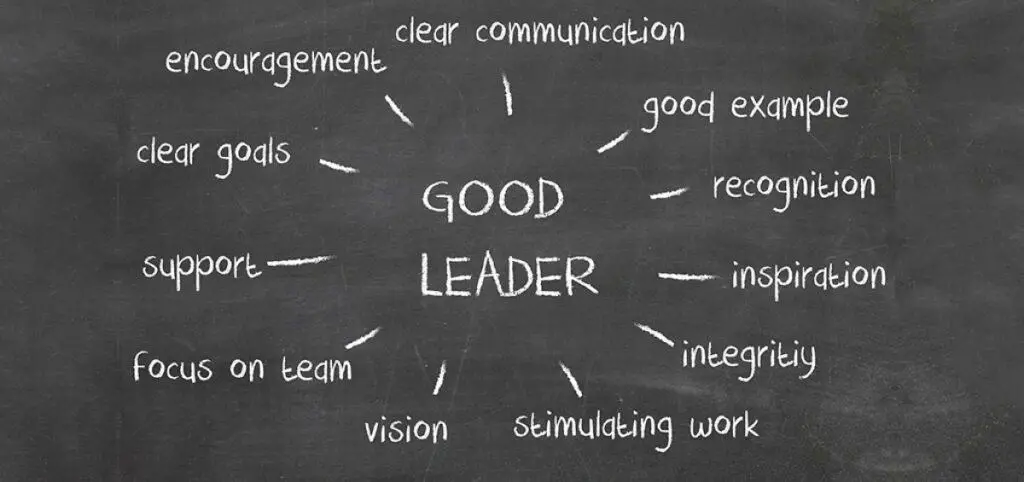
The ability to connect with their environment makes an introverted leader notice small details and make logical connections that others may miss.
Here’s of some of the top advantage that make introverts great leaders and life patnerts.
1. Active Listening Ability
Introverted leaders are also good listeners and always welcome different perspectives and new ideas.
According to Certified Professional Career Coach Nancy Ancowitz, as an introvert, your listening to talking ratio is higher. You tend to process things quietly in your head as opposed to out loud, which can just add noise to the conversation.
Clinical psychologist Dr. Laurie Helgoe, agrees stating that introverts are good listeners because they stays neutral while seeking to understand the speaker.
2. Introverts Think Before They Speak (and make decisions tactfully)
A 2008 study lead by the Georg Elias Müller Institute for Psychology in Germany found that introverts strategically take a longer time to process information than extroverts do.
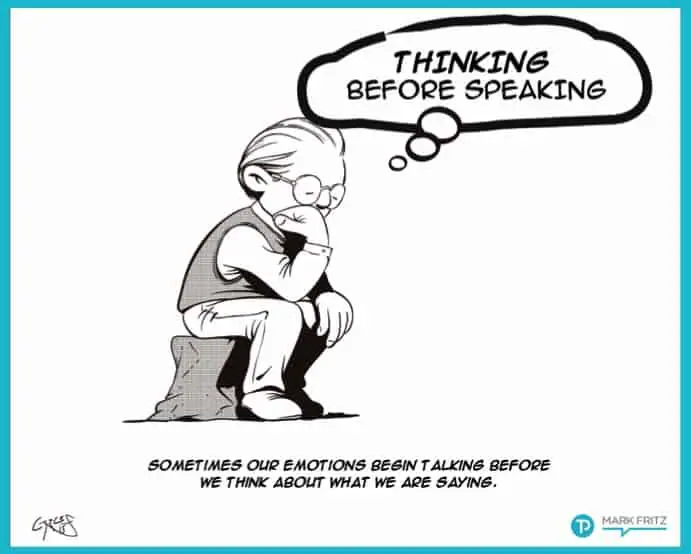
Introvert expert Dr. Jennifer Kahnweiler has found that introverts take longer to process because they process more thoughtfully than extroverts do.
In essence introverts take extra time to understand ideas in more depth before opening their mouth to talk, discuss, make a decision or move past the subject at hand.
3. Introverts “Calm Nature” Puts People At Ease
When someone is noticeably stressed their ‘vibe’ is contagious and can make others around them feel anxious or stressed.

But introverts are naturally calm and collected.
According to Jose Tolovi Neto a managing partner for a leading business consultant in Canada…,“while extroverts tend to get more visibly emotional and upset in critical situations, introverts do a great job at maintaining their composure.”
“When catastrophe strikes, introvert leaders are able to hold it together.”
4. Introverts Are Good At Focusing Deeply And Blocking Out Distractions
According to Jenn Granneman, introvert expert and psychology author, introverts excel at “”deep work”” requiring large chunks of uninterrupted focus. In fact, as an introvert myself, we need deep level focus to be happy.
Introverts are able to think deeply about things and pretty much despise trivial “”surface level”” tasks.
5. Detailed Oriented & Very Observant
Introverts are typically quiet. But formed out of our quite nature we possess a “superpower”.
Observation skills.
In today’s fast passed tech driven world we all multi-task on a daily basis. But the human brain wasn’t built for multitasking and despite your self-proclaimed ability to text and drive, humans aren’t good at multi-tasking.
Introverts are typically quite because their focus and attention is often being dedicated to observing the surrounding environment.
Other people in a meeting or any setting might talk and process things out loud. But, an introvert who seems to be sitting quietly is actually observing and reading the vibe of the room.
They soak in as many details as possible, an ability that can tell them tell what someone else is thinking just by reading their body language and other non-verbal cues.
6. Introverts Are More Independent (and need less supervision)
Cognitive-behavioral coach Dr. Robin Buckley says that, because of an introverts preference for independent work, they typically won’t need excessive supervision to get a task done.
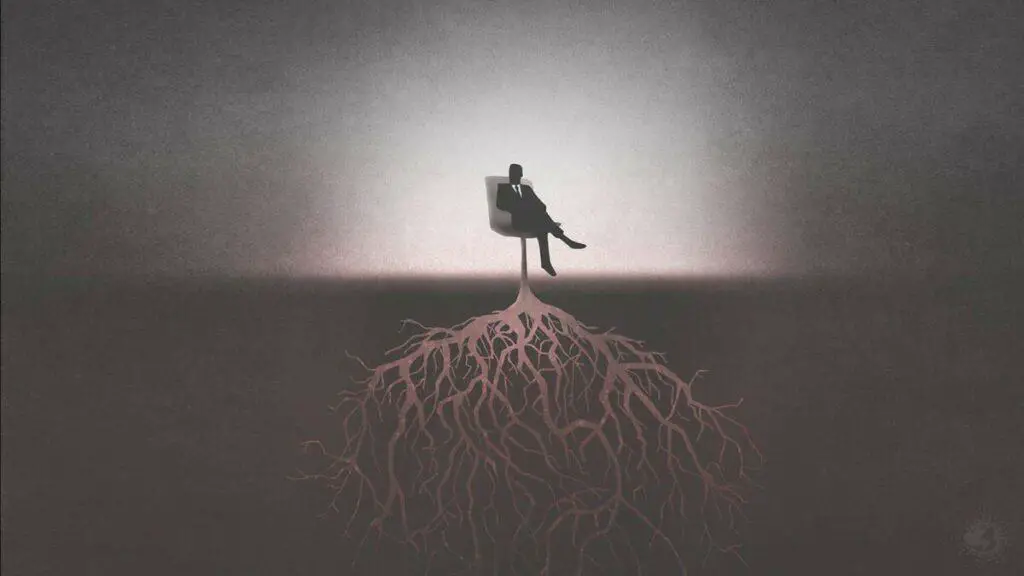
Introverts are used to relying on themselves and have developed the skills to work hard to figure out a solutions and accomplish goals on their own before going to someone to talk it out.
7. Excellent Problem-Solvers
Excellent problem solving skills goes hand-in-hand with independence. In order to be independent (which introverts like to be) excellent problem solving skills are required.
You can’t be independent if you can’t solve problems.
When discussing the advantage of being an introvert, international educator “B Scholarly LLC” says that when it comes to critical thinking and problem solving, an introverts natural tendency for contemplation provides them an edge.
8. Introverts Embrace Solitude (the power of taking time to yourself)
Introverts don’t just embrace solitude, they need it. Similar to an iphone, introverts need to take time to themselves in order to re-charge their energy.

This can be a disadvantage in some social situations, when the introvert battery is running low and there’s still 3 hours left in the team meeting.
But embracing solitude is also a gift, that can lead to less stress, better internal processing, and restorative reflection time.
Experts from around the world agree that Prioritizing time for yourself is essential for both long term physical and mental health.
9. Introverts Love Meaningful Conversations (we all should)
For an introvert, there’s nothing worse than a long drawn out ‘’surface level’’ small talk conversation.
Ugh – just kill me now!
But a deep conversation about meaningful detailed nuances or thoughtful revelations is an introverts ‘sweet spot’ in social situations.
According to Psychology Today, research shows what introverts have known all along. Why, as a society, need to start having deeper conversations with those we love, work with, and surround ourselves with.
Psychologist Dr. Matthias Mehl and his team published a study in 2010 concluding that higher levels of happiness are found in people who have more “substantial conversations” vs those who only engage in “small talk”.
10. Introverts Are More In-Tune (self-aware)
As written by psychology author Kendra Cherry…,
Developing self-awareness is one of the many strengths of introverts.

Clinical psychologist Dr. David Susman agrees that because introverts tend to be inward-turning, they spend a great deal of time examining their own internal experiences and processes.
Very Well Mind highlights the fact that Self-awareness is important to introverts, and as a result they often invest more time that others learning more about themselves.
Potential Disadvantages of Being An Introvert
Being an introvert isn’t all “sunshine and rainbows”. Society is geared towards extroverts, no doubt about it. Just watch a commercial for anything – all extroverts.
Being an introvert in an extroverts world certainly does come with some disadvantages.
1. Introverts Often Get Labeled as “Weird” or “Arrogant”
Because introverts keep to themselves and don’t often participate in the local ‘gossip’, drama, or small talk they often get labeled as weird.
Sometimes introverts can come across as arrogant or smug by having a deeper understanding of something but lacking the ‘human’ communication skills to relate to someone else.
2. Introverts Don’t Always Get Invited to The Party
Most introverts likely don’t want to go to the party anyways, but not getting invited doesn’t feel good either way. As an introvert myself I’d rather be included and decline, than to feel excluded.
But because we don’t always participate socially, us introverts often get overlooked when it comes to the party invites.
3. Difficulty Expressing Emotions
Expressing feeling and emotions can be difficult for introverts.

And according to the “Learning Mind” (an educational resource founded by psychology enthusiast Anna LeMind) for the same reasons that introverts prefer listing as opposed to talking, expressing feelings and emotions can be a struggle for introverts.
4. Potential Awkwardness In Social Settings
Social situations are not an introverts favorite place to be. We are not shy, and we don’t necisarily lack social skills, it’s just that (depending on the situation) as an introvert I’d rather be doing something else.
As an example, I love going out to the bar with one or two friends to talk about life and common events. However, I despise going to the bar with a large group.
Self describes introvert, author, and mindfulness coach Kyra Evans has found that socially awkward introverts are most at peace “when we have plenty of time alone to recharge”.
Kyra believes her ‘social awkwardness can be used as an advantage… “It’s exactly this comfort with being on the outside looking in that makes us uniquely equipped to see patterns that people who are more tightly woven into the social fabric might overlook.”
Famous and Successful Introverts
1. Albert Einstein
Albert Einstein is among the world’s most revered physicists and most noble and successful introverts ever to exist.
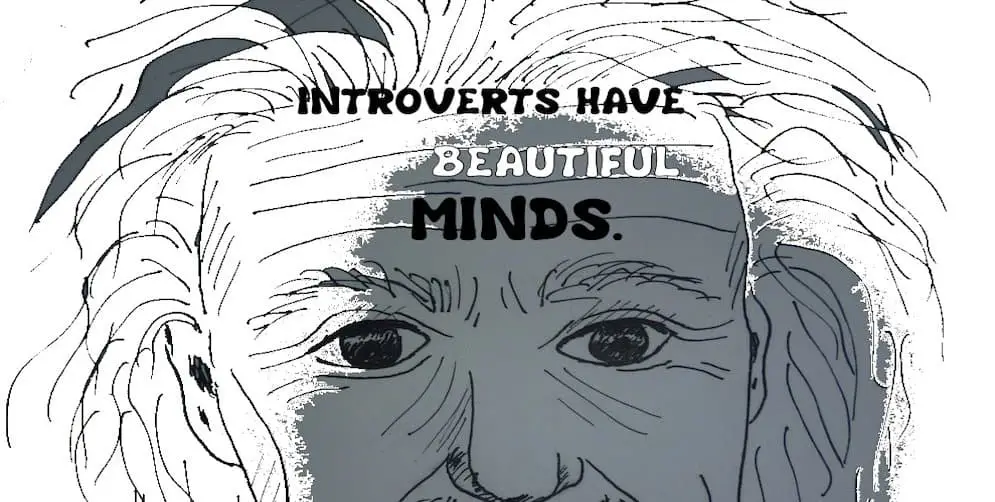
One of his famous sayings, ” The monotony and solitude of a quiet life stimulate the creative mind,” suggests that spending time alone is a vital ingredient for creativity.
Perhaps, his tendency to keep to himself and preference for a solitary lifestyle is what lead to his discovery of black holes, gravitational waves, and string theory.
2. Elon Musk
Elon is one of the most famous people in the world and also finds himself at the center of attention more often than he’d probably prefer. Never-the-less Musk is a self-proclaimed introvert spending much of his time during his youth reading, coding, and playing video games.
Having been named wealthiest man alive in 2022 Elon blows the myth that “only extroverts can succeed in business” right out of the water.
3. Abraham Lincoln
As history is written, young Abe Lincoln spent most nights studying, reading, and writing to become a self-educated lawyer.
As a self-educated introvert, seemingly, Lincoln’s political success was unlikely “”on paper””.
However, he made up for his weakness with exquisite communication skills which he cultivated in his own uniquely distinctive introverted manner.
4. Mark Zuckerberg
You might not understand how a founder and CEO of the most successful social media company in the world can be introverted, but Mark Zuckerberg is for sure a typical introvert.
Sheryl Sandberg, Facebook’s former COO, told the New York Times that the social network’s founder is indeed introverted and often does not seem very warm to people who don’t know him.
Mark’s introversion may be more clear as he spends more and more of his wealth and time developing the Metaverse. A place where people can meet and interact with -out ever really meeting in person.
5. Warren Buffett
Warren Buffet is known by many as the most successful financial investor of all time.

At a young age Warren was known for having the “intellect for business” but lacking the “persona”.
Classic introvert.
Warren astutely noticed that his quiet personality was holding him back. So like any stereotypical introvert, he methodically researched the problem and studied his way out of it.
6. Mahatma Gandhi
In a published book review Dr. Lesley A. Clack describes Gandhi as an example of a classic introvert that found power in his shyness.
Dr. Clark reflects on Ghandi’s introversion wondering if we, as a society, focus on extroverted personality traits too much.
“In a gentle way, you can shake the world.”—Mahatma Gandhi
7. Michael Jordan
Michael Jordan is one of the most famous people on the planet known for his god-like basketball talent.
He is also a confirmed introvert.
In order to become what he became Mike spent tens of thousands of hours practicing alone. During his playing career Jordan was not known as a socialite.
He prefers playing golf with a few close friends rather than partying in the club.
8. Nikola Tesla
Nicola Tesla, the true inventor or modern day electricity (and who’s name Elon Musk’s company is named after) is the most overlooked inventor and contributor to America in history.
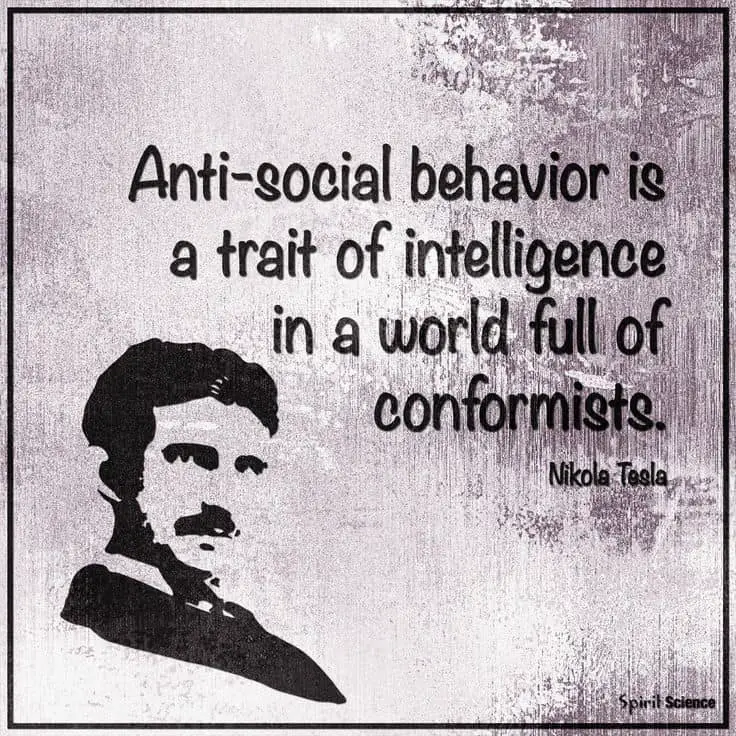
Tesla invented AC current electricity (used today), the radio, and hydro-electric power to name a quick few of thousands of inventions…, However, Tesla lacked the extroverted prowess to sell his inventions to the investors of the time.
9. Jay-Z
When you see Jay-Z on TV or in music videos he’s surrounded by people. But that doesn’t necessarily mean he an extrovert.
Dame Dash who co-founded Jay’Z’s first record label called Jay an introvert saying that when he first started he would “do nothing” on stage while performing.
10. Henry Ford
He popularized the assembly line and started the Ford motor company which is still run by Henry’s relatives today.
According to personality experts Mr. Ford was an introvert who was direct in verbalizing concerns and likely will not leave anything open to interpretation.
Henry was known as reserved, practical, self-sufficient, and hardworking to meet obligations.
Final Thoughts: Introversion ( good or bad ? )
It’s thought that 30% of the world are introverts. This means that over 2 billion introverts are currently surviving, thriving, and contributing to society on planet Earth.
Is being an introvert a bad thing? Certainly not.
Introverts have a unique gift waiting to be leveraged in the right direction. Introverts can impact and contribute to society at massive scales.
Speaking from my own experience, introversion is a gift and a curse.
A gift if you use it right, and a curse if you don’t leverage your skills to your advantage.
Loved what you read?
Hit that share button and let the world in on the secret – we’d be thrilled!
Got thoughts? We’re all ears for your feedback, corrections, or a good old chat. Don’t be shy; drop us a line.
And hey, don’t miss out on our curated list of must-reads in the recommended books section.
Big thanks for diving in with us today!




